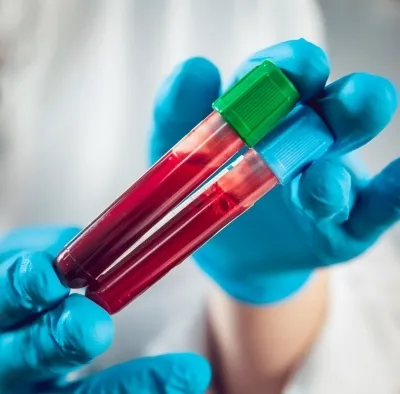Can a Simple Blood Test Detect Deadly Leukemia Early?

Synopsis
Key Takeaways
- The new blood test can detect leukemia risk early.
- It may replace painful bone marrow sampling procedures.
- Rare stem cells in the blood provide crucial information about blood disorders.
- The test could help identify other age-related blood conditions.
- Current findings are undergoing large-scale clinical trials.
New Delhi, June 28 (NationPress) A collaborative team of researchers from Israel and the United States has innovated a straightforward blood test capable of assessing an individual's risk for developing leukemia, a life-threatening blood cancer. This groundbreaking study, featured in Nature Medicine, indicates that this non-invasive test could potentially supplant the traditional, more painful method of bone marrow sampling currently used for diagnosing various blood cancers, as reported by Xinhua news agency.
The research team, spearheaded by experts from the Weizmann Institute of Science in Israel, concentrated on myelodysplastic syndrome (MDS)—an age-related disorder where blood-forming stem cells fail to mature properly.
MDS can result in severe anemia and has the potential to escalate into acute myeloid leukemia, one of the most prevalent forms of blood cancer among adults.
Currently, the diagnosis of MDS necessitates a bone marrow sampling procedure that requires local anesthesia and often leads to considerable discomfort and pain.
The research team uncovered that rare stem cells occasionally migrate from the bone marrow into the bloodstream, carrying vital information that can signal early indications of MDS.
Through advanced single-cell genetic sequencing, they successfully analyzed these cells from a routine blood sample, identifying early warning signs of the disease.
Moreover, the researchers discovered that these circulating stem cells can function as a biological “clock,” providing insights into an individual’s chronological age.
In men, these cells exhibit changes earlier than in women, which may elucidate the increased incidence of blood cancers in males.
“These migrating stem cells can act as a chronological age indicator, and the earlier changes in males may contribute to a heightened cancer risk, helping to explain the greater frequency of blood cancers among men,” stated Dr. Nili Furer from Weizmann.
The research team is optimistic that this blood test may also be instrumental in identifying other age-associated blood disorders in the future.
They have noted that their findings are currently undergoing validation in a large-scale clinical trial across multiple medical centers worldwide.









